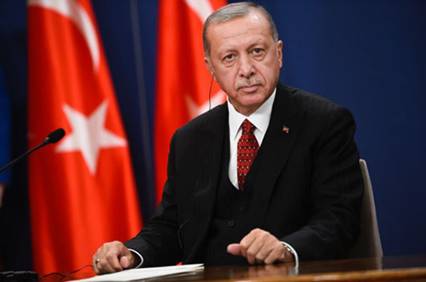The Hamas breakout against Israel on Oct. 7 was consciously part of a broader Islamist initiative to build a coalition with the anti-Western bloc of the People’s Republic of China (PRC), Russia, and Iran.
In that respect, it was also a move to force a break-up of the growing number of Muslim states which had been moving into better relations with Israel and the West. The fact that Bahrain, for example, quietly suspended its relations with Israel on Nov. 2 showed that the process was having an affect.
 President Recep Tayyip Erdoğan’s known support for extreme Islamism, deep anti-Westernism, and profoundly anti-U.S. feelings have been allowed to come to the fore.
President Recep Tayyip Erdoğan’s known support for extreme Islamism, deep anti-Westernism, and profoundly anti-U.S. feelings have been allowed to come to the fore.
The process of moving the Muslim world to act against the West and Israel had been escalating for some time.
On Oct. 18, at the last extraordinary Foreign Ministers’ Meeting of the Organization of Islamic Cooperation, Turkish Foreign Minister Hakan Fidan (former head of Turkish National Intelligence Organization/Milli İstihbarat Teşkilatı: MİT), among others, said, after the recent events, the Islamic world must think, speak and act together.
The Hamas terrorist attack of Oct. 7 was not against military but against civilian targets, civilians, elderly people, and women and children. The purpose was to provoke a blind, immediate, and vengeful reaction from the Israelis by causing civilian deaths in order to draw the sympathy not only of the Arab world but of the entire Muslim world, thus widening the anti-Israeli front.
The failure of this plan, since Israel decided to resort to an organized military operation, extending the preparation time, realizing the HAMAS trap and giving time for the evacuation of civilians, revealed the embarrassment and concern of the terrorist organization, which, having prepared itself for a response to a direct attack by the Israeli Defense Force (IDF), realized that the extension of the ground operation did not favor its plans.
The Muslim world presented initiatives to unify the front, with Turkey and Iran as the main actors. The reaction of the Turkish media was very characteristic, which, from the day of the terrorist attack, had all victimized Hamas in the name of the Palestinian people, and attacked Israel.
Much of the unity of the support of the Islamic world for Hamas was the result of an organized agitprop operation: the self-inflicted (ie: Hamas-staged) bombing of Al-Ahli Arab hospital in Gaza City on Oct. 17. Israeli and French military sources initially attributed it to the misfiring of an Islamic Jihad rocket, but it there is reason to believe it may have been a pre-placed explosive device to create a similar psychological warfare advantage comparable to the Markale Marketplace bombing in Sarajevo on Aug. 28, 1995.
The event triggered a simultaneous mass mobilization of Muslims with demonstrations of support in many cities in Europe and Muslim countries, in support of the Hamas project.
On the operational front, the situation seems more dangerous than that of the 1967 and 1973 wars, since then Israel’s opponents were the armies of Arab countries outside its borders, while now Hamas has shown that it has the potential not only to transfer the war to Israel’s territory, but also to mobilize mechanisms to incite the entire Arab and Muslim world to join forces, with the Palestinian people as the victims and with the backing of Turkey, Qatar, and Iran.
Israel is seeking a military victory against Hamas, but without the external involvement and operational complicity of Hizbullah, Iran, and other actors.
The speed and the prepared management of communication by the supporters of Hamas, the extensive stockpile of low-cost missile systems, and armed UAVs (unmanned combat aerial vehicles: drones), the extent and sophistication of the underground Hamas’s positions at its headquarters and the possibility of weaponizing civilians, gave hybrid characteristics to the very well thought-out attack of the terrorist organization.
